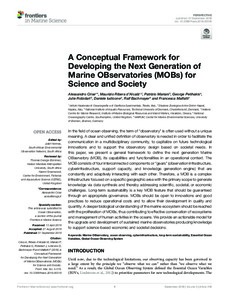| dc.contributor.author | Crise, Alessandro | |
| dc.contributor.author | Ribera d’Alcalà, Maurizio | |
| dc.contributor.author | Mariani, Patrizio | |
| dc.contributor.author | Petihakis, George | |
| dc.contributor.author | Robidart, Julie | |
| dc.contributor.author | Iudicone, Daniele | |
| dc.contributor.author | Bachmayer, Ralf | |
| dc.contributor.author | Malfatti, Francesca | |
| dc.date.accessioned | 2020-05-27T13:41:16Z | |
| dc.date.available | 2020-05-27T13:41:16Z | |
| dc.date.issued | 2018 | |
| dc.identifier.citation | Crise, A.; Ribera d’Alcalà, M.; Mariani, P.;
Petihakis, G.; Robidart, J.; Iudicone, D.;
Bachmayer, R. and Malfatti, F. (2018) A
Conceptual Framework for Developing the Next Generation
of Marine OBservatories (MOBs) for Science and Society.
Frontiers in Marine Science, 5:318, 8pp. DOI: 10.3389/fmars.2018.00318 | en_US |
| dc.identifier.uri | http://hdl.handle.net/11329/1341 | |
| dc.identifier.uri | http://dx.doi.org/10.25607/OBP-847 | |
| dc.description.abstract | In the field of ocean observing, the term of “observatory” is often used without a unique
meaning. A clear and unified definition of observatory is needed in order to facilitate the
communication in a multidisciplinary community, to capitalize on future technological
innovations and to support the observatory design based on societal needs. In
this paper, we present a general framework to define the next generation Marine
OBservatory (MOB), its capabilities and functionalities in an operational context. The
MOB consists of four interconnected components or “gears” (observation infrastructure,
cyberinfrastructure, support capacity, and knowledge generation engine) that are
constantly and adaptively interacting with each other. Therefore, a MOB is a complex
infrastructure focused on a specific geographic area with the primary scope to generate
knowledge via data synthesis and thereby addressing scientific, societal, or economic
challenges. Long-term sustainability is a key MOB feature that should be guaranteed
through an appropriate governance. MOBs should be open to innovations and good
practices to reduce operational costs and to allow their development in quality and
quantity. A deeper biological understanding of the marine ecosystem should be reached
with the proliferation of MOBs, thus contributing to effective conservation of ecosystems
and management of human activities in the oceans. We provide an actionable model for
the upgrade and development of sustained marine observatories producing knowledge
to support science-based economic and societal decisions. | en_US |
| dc.language.iso | en | en_US |
| dc.rights | Attribution 4.0 International | * |
| dc.rights.uri | http://creativecommons.org/licenses/by/4.0/ | * |
| dc.subject.other | Marine OBservatory | en_US |
| dc.subject.other | Cyberinfrastructure | en_US |
| dc.subject.other | Long-term sustainability | en_US |
| dc.subject.other | Essential ocean variables (EOV) | en_US |
| dc.subject.other | Global Ocean Observing System (GOOS) | en_US |
| dc.title | Conceptual Framework for Developing the Next Generation of Marine OBservatories (MOBs) for Science and Society. | en_US |
| dc.type | Journal Contribution | en_US |
| dc.description.refereed | Refereed | en_US |
| dc.format.pagerange | 8pp. | en_US |
| dc.identifier.doi | 10.3389/fmars.2018.00318 | |
| dc.subject.parameterDiscipline | Parameter Discipline::Cross-discipline | en_US |
| dc.bibliographicCitation.title | Frontiers in Marine Science | en_US |
| dc.bibliographicCitation.volume | 5 | en_US |
| dc.bibliographicCitation.issue | Article 318 | en_US |
| dc.description.sdg | 14.A | en_US |
| dc.description.bptype | Manual (incl. handbook, guide, cookbook etc) | en_US |
| dc.description.frontiers | 2018-09-07 | |
| obps.contact.contactname | Alessandro Crise | |
| obps.contact.contactemail | acrise@inogs.it | |
| obps.resourceurl.publisher | https://www.frontiersin.org/articles/10.3389/fmars.2018.00318/full | en_US |
 Repository of community practices in Ocean Research, Applications and Data/Information Management
Repository of community practices in Ocean Research, Applications and Data/Information Management

